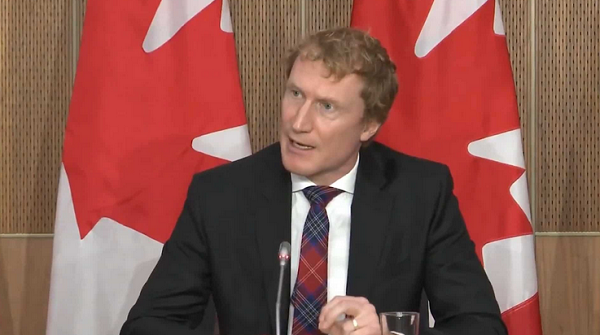Figures show huge growth in the number of asylum claims by foreign students since 2018
Asylum claims by international students have risen more than 1,500 per cent in the past five years, figures obtained by The Globe and Mail show, as experts warn that the study-permit system is being exploited as a way to enter and remain in Canada.
The sharp increase is particularly acute at colleges, where claims at some schools have climbed in excess of 4,000 per cent since 2018. Students at major universities, however, tend to lodge fewer claims than at colleges, the figures show.
The increase in asylum claims coincides with a steep rise in the number of international students arriving here over the past five years, which the government has now taken steps to reduce, partly to ease pressure on housing.
In January, Immigration Minister Marc Miller imposed a two-year cap on international study-permit applications to curb the rapid growth in foreign students entering Canada.
Figures from Immigration, Refugees and Citizenship Canada, obtained by The Globe, show that in 2018 there were 1,515 claims for asylum among international students, with the number rising to 25,465 in 2023.
The IRCC data on asylum claims at each college and university have not been published.
Earl Blaney, a licensed immigration consultant from London, Ont., said it was easier for people from some countries to enter Canada by obtaining a study permit than a visitor’s visa, as they have a better chance of being allowed into the country if they possess the right credentials to study here.
“To effectuate a front-of-the-line claim for refugee status, you need to be in Canada. The issue is that there is exploitation happening using a legitimate study-permit framework to legitimize entry,” he said. “Some immigration consultants are encouraging students to claim asylum to stay.”
At many colleges, the increases in asylum claims are significant. At Seneca College in Ontario, which offers courses ranging from accounting to civil engineering and fashion, there were 45 asylum claims in 2018, and 1,135 in 2023 – an increase of 2,400 per cent.
At Niagara College, the number of asylum claims jumped to 930 in 2023, from 20 in 2018, a rise of 4,550 per cent. At Conestoga College, there were 25 asylum claims among 6,000 study-permit holders in 2018. Five years later, there were 665 asylum claims among the 81,335 permit holders.
At Cape Breton university in Nova Scotia, there were 15 asylum claims in 2018. That increased to 665 asylum claims last year. And at the Université du Québec à Trois-Rivières, there were only 20 asylum claims by students in 2018, and 700 in 2023.
The numbers are less pronounced at universities. For example, only 35 international students at McGill University, compared with five in 2018, lodged claims for asylum last year, according to the IRCC figures. Fifty-five students at the University of Toronto applied to stay in Canada as a refugee, up from 10 five years ago.
Toronto lawyer Vaibhav Roy said it was “common knowledge amongst the legal community” that students who would not have the scores required for permanent residence – with steep competition for express entry – have been claiming asylum to try to stay in Canada.
“A lot of immigration lawyers are telling them to file refugee claims to stay in the country,” he said. “It’s a last strategy to keep staying here.”
Immigration lawyer Richard Kurland said a lot of international students had been promised by consultants working abroad that a study permit was a route to permanent residence, which is not always the case.
“Where does that leave them? Return home poor and in embarrassment, or claim refugee status, which gets them another three to four years,” he said, adding that they could then qualify for a work permit.
Syed Hussan, executive director of Migrant Workers Alliance for Change, said many international students claimed asylum while here because the situation in their home countries changed.
He said some from Haiti studying in Quebec have claimed asylum as civil order has broken down in the Caribbean country, which has been ravaged by gang violence, and that many asylum claims have been lodged by Indians who have seen fundamentalists target particular ethnic groups.
In the two-year cap imposed in January, IRCC allotted a limited number of study permits to provinces, which they could then allocate to postsecondary institutions.
Figures from the Ontario government show that public colleges are being allocated far more study permits than public universities, this year, while private colleges have been squeezed out.
Ontario is awarding 35,788 study permits to public universities, including Toronto and Carleton in Ottawa, and 186,167 to public colleges.
Seneca College has been allocated 20,388 study permits, compared with 3,362 for the University of Ottawa this year. The University of Waterloo has been allotted 1,212 study permits while Conestoga College has been allocated 19,885.
Queen’s University only has 749 permits, while Fanshawe College of Applied Arts and Technology has 16,752. The University of Toronto has been allowed 6,256 study permits and Niagara College 9,516.
Conservative Immigration critic Tom Kmiec criticized the government for not acting earlier to deal with rising asylum claims among international students.
“Instead of acting immediately when they saw worrying trends in asylum claims by international students, they tried to ignore the problem for years until it was too late,” he said.
This month’s federal budget detailed $1.1-billion over three years for municipalities and provinces to help meet the rising cost of housing asylum seekers, including those fleeing war-torn countries. It followed complaints, particularly from Quebec, that they lack funds to accommodate the steep rise in asylum claimants.
Some asylum seekers have been living in shelters for homeless people or on the streets, with many housed in hotel rooms while their claims are processed.
The budget also earmarked $141-million for Ottawa to pay for temporary lodging for asylum claimants, who cannot be accommodated because provincial places are full.
Michael Wales, director of communications at Niagara College, said he did not want to speculate on whether the reduced number of study permits this year would translate into fewer asylum claims.
“Providing advice or support to students contemplating an asylum claim is beyond the scope of our licensed international student advisers,” he said. “If asked, our advisers would refer the student to a community agency that is qualified to offer that type of advice or support.”
This article was first reported by The Globe and Mail
















